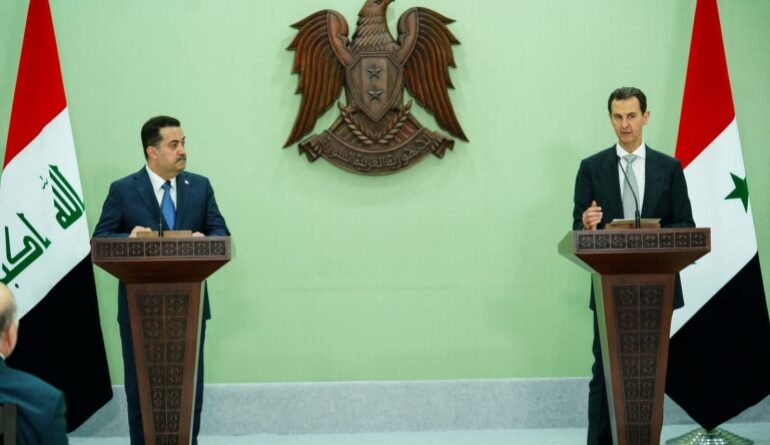
The two leaders say they discussed the fight against drugs, the return of refugees and the lifting of Western sanctions imposed on Syria.
Iraq’s prime minister has held talks with Syrian President Bashar al-Assad in Damascus during the first such trip to the war-torn country since the 12-year conflict began.
Iraq and Syria have maintained close relations for years, even after many Arab countries pulled their ambassadors from Damascus and Syria’s membership of the 22-member Arab League was suspended due to a brutal crackdown on protesters. in 2011.
Assad received Prime Minister Mohammed Shia al-Sudani at the presidential palace in Damascus on Sunday, leading a high-ranking delegation.
Later, the two leaders told reporters they discussed the fight against cross-border drug trafficking, the return of Syrian refugees and the imperative to lift punitive Western sanctions imposed on Syria.
They also discussed Israeli attacks on the war-torn country and water shortages in the Euphrates, a river that runs through both countries, due to the upstream reservoir in Turkey.
Al-Sudani said they discussed ways to combat drought conditions in the two countries caused by reduced rainfall, climate change and upstream damming by Turkey.
“We have to cooperate to get our fair share of water,” Sudani said.
Al-Sudani’s office said the talks also covered how to work together to fight “terrorism”.
“We face several challenges, first and foremost that of terrorism,” Assad later said at a joint news conference with Sudani.
The two countries, where Iran enjoys extensive influence, share a 600-kilometer (373-mile) border.
In June 2014, the armed group ISIL (ISIS) declared the establishment of a self-styled caliphate in large areas under its control in Iraq and Syria.
After a years-long campaign that left tens of thousands dead in both countries, ISIL was defeated in Iraq in 2017 and in March 2019 in Syria. In recent years, Syrian government forces regained control of much of Syria with the help of Russia and Iran.
Earlier this year, Syria’s membership in the Arab League was restored and Assad attended the Arab summit held in Saudi Arabia in May.
Syrian President Bashar al-Assad and Iraqi Prime Minister Mohammed Shia al-Sudani attend a press conference in Damascus, Syria [Iraqi Prime Minister’s Media Office via Reuters]
Al Jazeera’s Mahmoud Abdelwahed, reporting from Baghdad, said: “The importance of this visit lies in the fact that both leaders seem willing to build on the momentum of this visit, to break their isolation countries for years. the region.”
“Iraq has been a great supporter of Syria. It has supported Syria’s return to the Arab League. Iraq has also called on the international community to lift the sanctions imposed on Syria and also to facilitate the entry of help the Syrian people,” Abdelwahed said.
Syria’s conflict, which began in March 2011, has killed half a million people and displaced half of the country’s pre-war population of 23 million, including more than 5 million who became refugees .
Iraq hosts about 250,000 Syrian refugees.
“We are interested in working through official and government channels to resolve the refugee issue and ensure their safe return as soon as the situation becomes stable in the places where they reside,” al-Sudani said.
Al-Sudani was invited to visit Damascus during a trip by Syrian Foreign Minister Faisal Mekdad to Baghdad last month.
The Iraqi prime minister said countries around the world that have citizens in al-Hol camp in northeastern Syria should start working to repatriate them as Baghdad is doing.
Al-Hol camp is home to around 51,000 people, including the wives, widows and other relatives of ISIL members. Most are Syrian and Iraqi, but there are about 8,000 women and children of 60 other nationalities who live in a part of the camp known as the Annex. They are generally considered the staunchest supporters of ISIL among the camp’s residents. Many countries refuse to repatriate their citizens out of concern that they may pose a security threat.
[ad_2]
Source link





